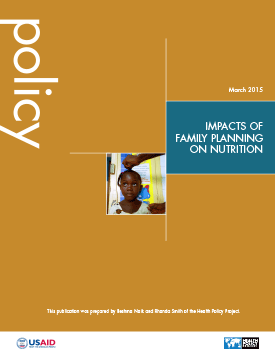The Health Policy Project ended in 2016. Work continued under Health Policy Plus (HP+) until 2022.
PUBLICATION
Author(s): Ellen Smith, Reshma Naik, and Rhonda Smith
Primary Language: English
Date: 3/2/2015
Abstract:
Tackling undernutrition and achieving food security will require cross-sector collaboration, innovative approaches, and optimizing the use of all available interventions. In 2014, the USAID-funded Health Policy Project conducted two reviews of the empirical evidence on the impacts of one intervention—family planning—on food security and nutritional status, respectively.
The review on nutrition showed that when women exercise their freedom and right to access voluntary family planning to meet their fertility intentions, there is a natural decline in the prevalence of high-risk and unintended pregnancies; and that by averting such pregnancies, improvements in key maternal, infant, and child nutrition outcomes can be achieved.
The review on food security showed that voluntary family planning can decrease fertility rates and slow the pace of population growth, thus reducing food needs as well as strains on agricultural resources. In this way, family planning supports the four main pillars of food security—availability, access, utilization/consumption, and stability—and can help ensure that people have both physical and economic access to sufficient food.
Evidence from both reviews also suggests that the role of voluntary family planning in decreasing rates of maternal mortality and improving women’s empowerment can have profound impacts on food security and nutrition.
Summary briefs are available for each report: food security here, and nutrition here.
Also see the companion desk review synthesizing the programmatic experiences of integrating family planning with food security and nutrition. It was conducted by the Food and Nutrition Technical Assistance III Project (FANTA) and is available here: http://www.fantaproject.org/focus-areas/food-security/desk-review-programs-integrating-family-planning-food-security-and-nutrition.
Family Planning/Reproductive Health (FP/RH) Literature Review Report Global


